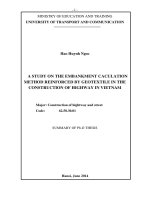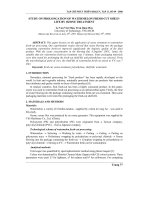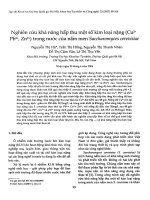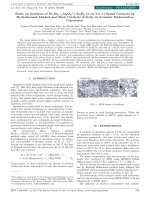Study on warpage of CD & DVD discssubstrate by injection molding process
Bạn đang xem bản rút gọn của tài liệu. Xem và tải ngay bản đầy đủ của tài liệu tại đây (314.63 KB, 3 trang )
78
Hoang Van Thanh, Tran Dinh Son
STUDY ON WARPAGE OF CD & DVD DISCSSUBSTRATE
BY INJECTION MOLDING PROCESS
Hoang Van Thanh*, Tran Dinh Son**
The University of Danang, University of Science and Technology;
*
, **
Abstract - This research investigated the optimization of injection
molding parameters for the minimum warpage of CD & DVDdisc
substrate of Polycarbonate (PC). CD & DVD disc substrate was
first designed by Pro/E 5.0. The Moldflow Plastics Insight 6.1 is
used to mesh and simulate the warpage. In order to find out
recommended parameters, the study used Taguchi technique in
decreasing warpage of CD & DVD substrate. Parameters or factors
employed are mold temperature, melt temperature, packing
pressure, packing time, and cooling time. An ANOVA table was
used to examine the significance of parameters. Results of
variance analysis show that packing time is considered as the most
significant parameter for the minimum warpage of CD & DVD disc
substrate. Cooling time and mold temperatureare found as the
second and third most significant parameters in this study. The
recommended parameters were established and then verified by
the injection molding simulation and the minimum warpage
obtained was 0.1627mm.
LM) supplied by Teijin Chemical Ltd. Figure 1 illustrates
the relationship of specific volume, temperature and
pressure of PC material. Simulation set-up of an electrical
injection machine is from Welltec Machinery Ltd. The
mesh model is established with solid mesh number of
150968 as shown in Figure 2.
Key words - CD & DVD production; injection molding process;
warpage; Taguchi Method; parameters.
1. Introduction
Compact Discs (CDs) and Digital Versatile Discs
(DVDs) are electro-optical devices. Nowadays, CD&
DVD discs are widely used in recording or reading data.
The warpage of CD & DVD discs plays an important role
in their working quality [1]. The quality mainly depends on
CD & DVD production by injection molding process.
Some results of previous studies show relating to CD &
DVD production. Shia-Chung Chen et al. [2] studied mold
temperature variation for assisting micro-molding of DVD
micro-featured substrate. Pulsed cooling technology has
been successfully employed in low cycle time molding
cases to either reduce cycle time or improve part qualities
without a cycle time increase, or both. Cheng-Hsien Wu et
al. [3] investigated the application of injection molding and
injection compression molding processes to produce
diffraction gratings. Grating made by injection
compression molding has a much smaller warpage than
that made by injection molding. Jeong Ho Moon et al. [4]
developed coatings for optical discs in high-density digital
versatile disc system (HD-DVD). The result shows that
HD-DVD has good optical and mechanical properties.
Those studies above have improved the qualities of the
CD & DVD. The objective of this study is to investigate
injection molding parameters affecting warpage of
CD&DVD substrate products using Taguchi method
thanks to simulation. This problem needs to be made better
at disc manufacturing Company, Hoa Cam Industrial Zone,
Danang [5].
2. Experimental Set-up and Method
2.1. Material and injection molding machine
The material used in this study is PC (Panlite L-1225-
Figure 1. pVT property of PC material
Figure 2. Mesh model
2.2. Design of experiment
Table 1. The control factors and levels of Taguchi experiments
Factors
Levels
1
2
3
Mold temperature A (0C)
70
80
90
Melt temperature, B (0C)
290
310
330
Packing pressure, C (MPa)
10
12
14
Packing time, D (s)
1.5
2.5
3.5
Cooling time, E (s)
2
3
4
ISSN 1859-1531 - THE UNIVERSITY OF DANANG, JOURNAL OF SCIENCE AND TECHNOLOGY, NO. 12(85).2014, VOL. 1
Table 2. Design Table L27 of Experimental Method
79
Therefore, the objective of this experiment is to minimize
the Signal-to-Noise value (𝜂𝑆𝑇𝐵 ). It means that desired
values are minimum warpage.
A
B
C
D
E
Mold
temp.
Melt
temp.
Packing
pressure
Packing
time
Cooling
time
1
1
1
1
1
1
2
1
1
1
1
2
3
1
1
1
1
3
4
1
2
2
2
1
Test
No.
A
B
C
D
E
Warpage
5
1
2
2
2
2
1
70
290
10
1.5
2
0.2178
13.2388
6
1
2
2
2
3
2
70
290
10
1.5
3
1.213
-1.6772
7
1
3
3
3
1
3
70
290
10
1.5
4
1.213
-1.6772
8
1
3
3
3
2
4
70
310
12
2.5
2
0.2268
12.8871
Test
No.
3. Result and Discussion
Table 3. The Taguchi L27 orthogonal array withExperimental
results for warpage
S/N ratio (dB)
ηSTB
9
1
3
3
3
3
5
70
310
12
2.5
3
0.3120
10.1169
10
2
1
2
3
1
6
70
310
12
2.5
4
0.3120
10.1169
11
2
1
2
3
2
7
70
330
14
3.5
2
8.901
-18.9888
12
2
1
2
3
3
8
70
330
14
3.5
3
8.901
-18.9888
13
2
2
3
1
1
9
70
330
14
3.5
4
0.2396
12.4103
14
2
2
3
1
2
10
80
290
12
3.5
2
0.2255
12.9371
15
2
2
3
1
3
11
80
290
12
3.5
3
1.599
-4.0770
16
2
3
1
2
1
12
80
290
12
3.5
4
1.599
-4.0770
17
2
3
1
2
2
13
80
310
14
1.5
2
0.2285
12.8223
18
2
3
1
2
3
14
80
310
14
1.5
3
0.2288
12.8109
19
3
1
3
2
1
15
80
310
14
1.5
4
0.2288
12.8109
20
3
1
3
2
2
16
80
330
10
2.5
2
0.2321
12.6865
21
3
1
3
2
3
17
80
330
10
2.5
3
0.2331
12.6492
22
3
2
1
3
1
18
80
330
10
2.5
4
0.2331
12.6492
23
3
2
1
3
2
19
90
290
14
2.5
2
0.2303
12.7541
24
3
2
1
3
3
20
90
290
14
2.5
3
1.735
-4.7860
25
3
3
2
1
1
21
90
290
14
2.5
4
1.735
-4.7860
26
3
3
2
1
2
22
90
310
10
3.5
2
0.3059
10.2884
27
3
3
2
1
3
23
90
310
10
3.5
3
11.46
-21.1837
24
90
310
10
3.5
4
11.46
-21.1837
25
90
330
12
1.5
2
0.2301
12.7617
26
90
330
12
1.5
3
0.2325
12.6715
27
90
330
12
1.5
4
0.2325
12.6715
The control parameters selected in this study are mold
temperature (A), melt temperature (B), packing pressure (C),
packing time (D), and cooling time (E) [6, 7, 8]. Table 1
shows the control factors and levels of Taguchi experiments.
In order to evaluate the effects of the injection molding
parameters to the warpage of the CD& DVD substrate, an
L27 orthogonal array [9] of three levels with 5 parameters
shown as Table 2, was used for experimental design.
Twenty seven treatments were performed and each one was
simulatedone time.
The quality characteristic is warpage. The signal-tonoise (S/N) ratio is usually used to justify the effects of
parameters. In this investigation, the minimum warpage is
desired. Therefore, the quality characteristic for warpage is
Smaller-The-Better (STB) expressed as the equation 1 [9].
1
𝜂𝑆𝑇𝐵 = −10𝑙𝑜𝑔 [ ∑𝑛𝑖=1 𝑦𝑖2 ] (1)
𝑛
Where 𝜂𝑆𝑇𝐵 is the Signal-to-Noise ratio for STB, yi is
the experimental value of ith part and n is the total number
of experimental parts. This study selected n of 1 (n=1).
According to the Taguchi’s technique, a smaller Signal-toNoise value indicates better quality characteristic.
Table 4. Response table for S/N Ratios, STB for warpage
Level
Mold
temp.
Melt
temp.
Pack.
Pack. time Cool. time
pressure
1
1.9376
1.9833
1.7545
9.6037
9.0430
2
9.0236
4.3873
8.4454
8.2542
-0.2738
3
1.0231
5.6136
1.7843
-5.8737
3.2150
Delta (Δ) 8.0005
3.6303
6.6910
15.4774
9.3168
5
4
1
2
Rank
3
Table 5. ANOVA for significant parameters of warpage
Source
A. Mold. temp.
B. Melt temp.
C. Pack. pres.
D. Pack. time
E. Cool. time
Error
Total
SS
dof
MS
F
P
345.16
61.39
267.42
1322.90
398.82
1470.31
3866.01
2
2
2
2
2
16
26
172.58
30.69
133.71
661.45
199.41
91.89
1.88
0.33
1.46
7.20
2.17
0.185
0.721
0.263
0.006
0.147
80
Hoang Van Thanh, Tran Dinh Son
Table 3 shows the experimental results, and S/N ratios
of the warpage of 27 different experimental conditions.
The results represent large deviations of test 7, 8 and 23,
24 in comparison with others S/N ratios, but the deviations
only occur at the runner system. The response is warpage
in mm. The values in Table 4 are calculated by means of
the mean value of all experiments that are the same level.
The Delta (Δ) is defined as the equation (2). The value of
delta (Δ) reflects the significance rank of each factor.
Delta (Δ) = max(S/N) – min (S/N)
(2)
Figure 3. S/N plot of experimental results for Warpage
packing time of 1.5 s, and cooling time of 2 s. After
experiment with these verification parameters,
experimental results show that minimum total warpage
0.1627mm. It can be clearly seen that these values are
much lower in comparison with the warpages of CD &
DVD substrate in 27 tests before verification. Figure 4 is
illustration of warpage of CD&DVD substrate after
verification test.
4. Conclusion
This study has investigated the effect of injection
molding parameters to warpage of CD & DVD substrate
due to Taguchi L27 orthogonal array. With the
recommended parameters achieved from the experimental
design, packing time is the most significant parameter for
reduction of the warpage problem. Longer packing time
results in the lower warpage. Cooling time and mold
temperature have been found as the second and third most
significant parameters in this study.
Acknowledgment
The authors would express their acknowledgement to
Chipviet Technology Solutions Co., LTD, Thanh Khe
District, and Thuy Hang Trade Company, Hoa Cam
Industrial Zone, Danang City for providing the essential
information for the study.
REFERENCES
Figure 4. The warpage after verification
Figure 3 is the Signal-to-Noise ratio plot of
experimental results for warpage testing. It is obvious that
warpage decreases with the increase in packing time and
with the decrease in melt temperature. Mold temperature,
packing pressure, and packing time increasing from level 2
to level 3 lead to the decrease in warpage. The warpage
increases when levels of mold temperature, melt
temperature, and packing pressure are from level 1 to level
2. Recommendedsetting of parameters is A2B3C2D1E1, i.e.,
A = 80 0, B = 3300C, C = 12 MPa, D = 1.5 s, and E = 2 s.
Table 5 is the results of the ANOVA analysis and the
packing time is the most significant parameter with a
confidence level of 99%.
Verification test of recommendedparameters:
According to Figure 3, the verification parameters are
A2 B3 C2 D1 E1, namely, mold temperature of 800C, melt
temperature of 3300C, packing pressure of 12 MPa,
[1] Alan E. Bell, Christopher J. Cookson, "Next generation DVD:
application requirements and technology", Signal Processing:
Image Communication 19 (2004) 909-920.
[2] Shia-Chung Chen, Ying-Cheih Wang, Sung-Chil Liu, Jin-Chuan
Cin, "Mold temperature variation for assisting micro-molding of
DVD micro-featured substrate and dummy using pulsed cooling",
Sensors and Actuators A: Physical 151 (2009) 87-93.
[3] Cheng-Hsien Wu, Wei-Shiu Chen, "Injection Molding and Injection
Compression Molding of three-beam grating of DVD pickup lens",
Sensors and Actuators A 125 (2006) 367-375.
[4] Jeong Ho Moon, Hak Soo Han, Yong Gun Shul, Do Hoon Jang,
Muyng Do Ro, Du Suk Yun, "A study on UV-curable coatings for
HD-DVD: Primer and top coats", Progress in Organic Coatings 59
(2007) 106-114.
[5] Hoang Van Thanh, Tran Dinh Son, "Study on Designing and
Manufacturing of Automatic Disc Cooling and Conveyor System for
DVD Production Line", VCCA 2013.
[6] Hoang Van Thanh, Chao-Chang A. Chen, Chia-HSing Kuo,
"Injection Molding of PC/PMMA Blends for Fabricated of the
Secondary optical Elements of LED Illumination", Advanced
Materials Research Vol. 579 (2012) pp 134-141© (2012) Trans
Tech Publications, Switzerland, doi: 10.4028/www.scientific.net/
AMR.579.134.
[7] Hoang Van Thanh "Injection Molding Technology of Optical
Elements in LED Illumination", (2013) LAP LAMBERT Academic
Publishing.
[8] Hoang Van Thanh, Tran Dinh Son, "Study of Process Conditions
affecting Product quality by Injection molding process", The 3rd
National Science and Technology Conference of Mechanical
Engineering, Hanoi, 2013.
[9] Ross P. J. (1996), Taguchi Techniques for Quality Engineering, 2nd
Edition, McGraw –Hill, New York.
(The Board of Editors received the paper on 09/06/2014, its review was completed on 14/09/2014)









